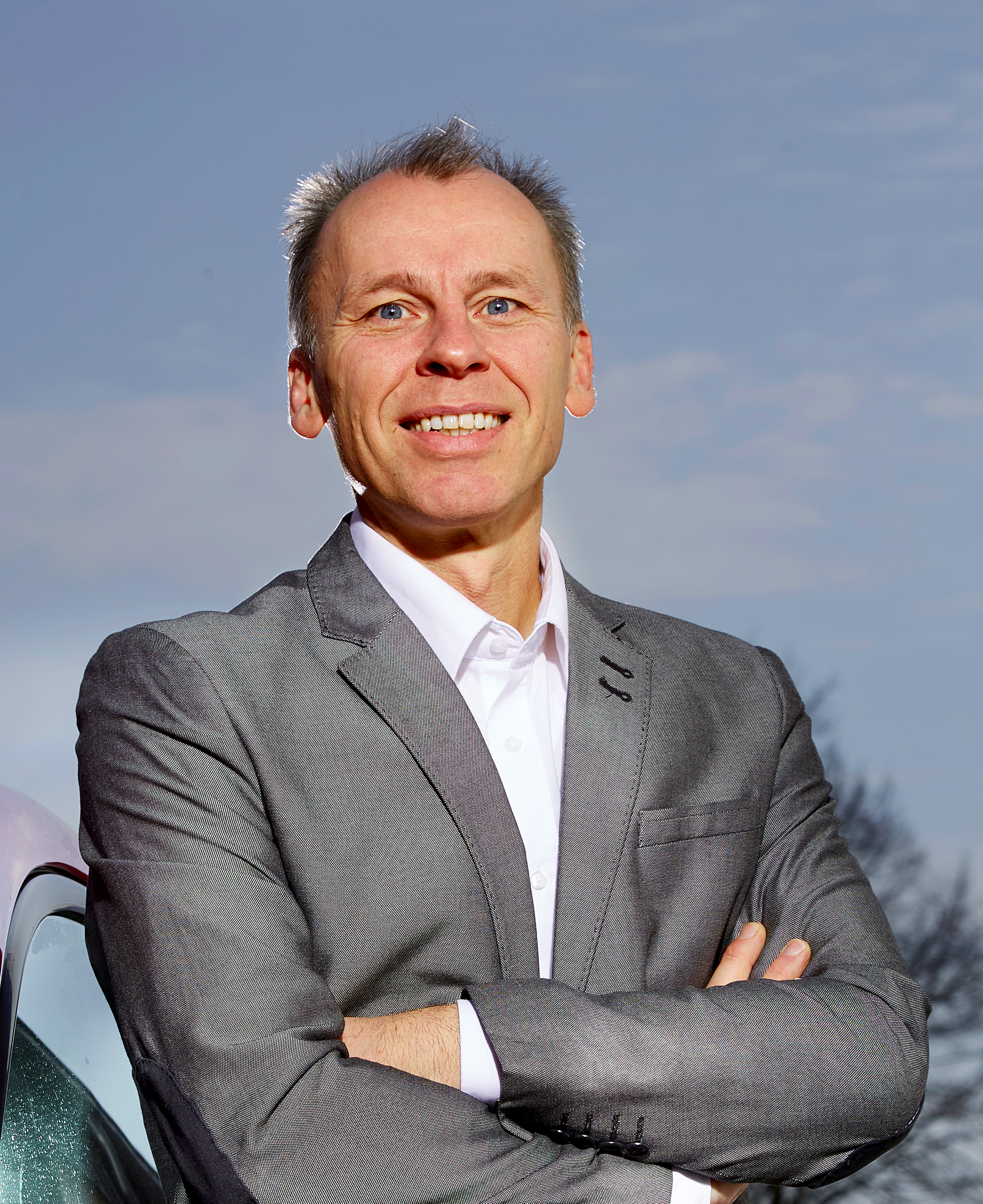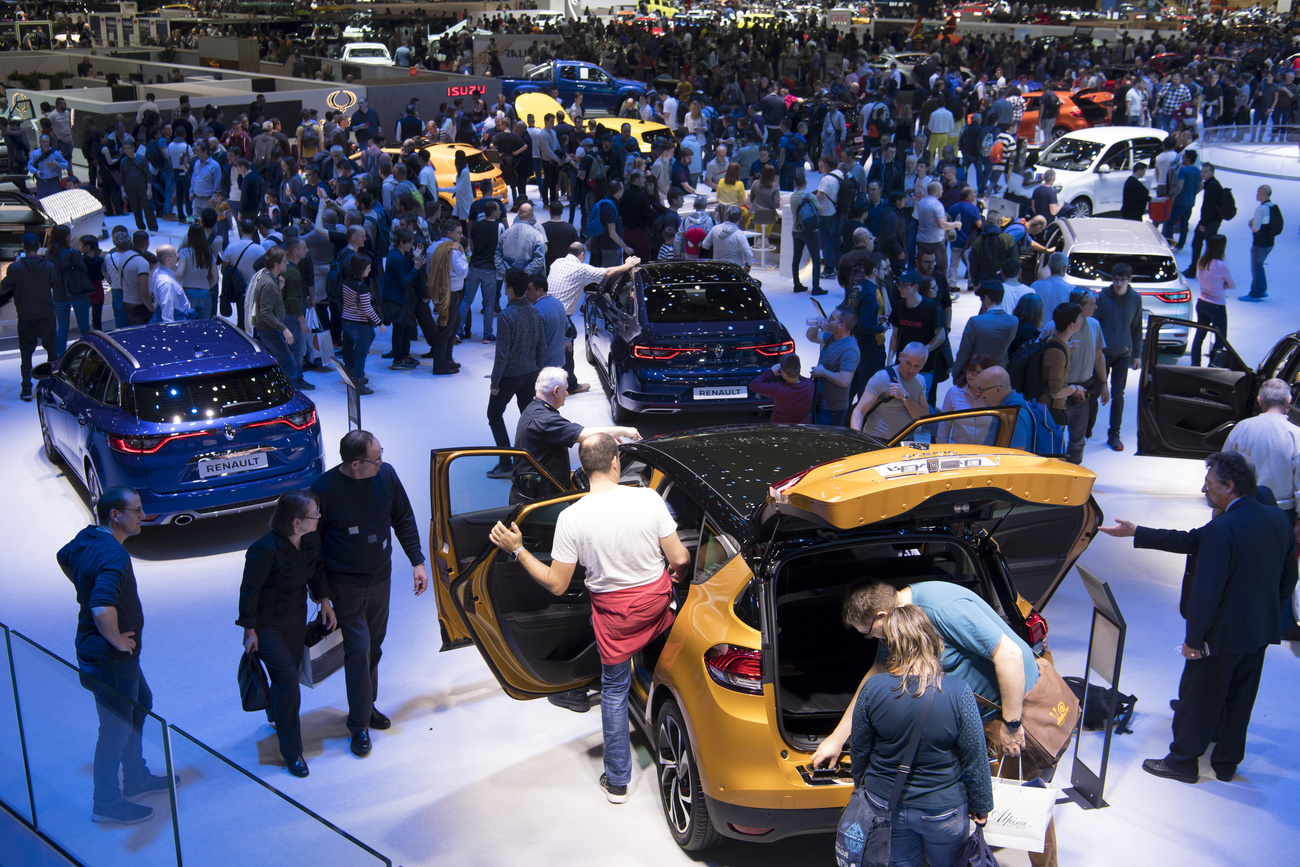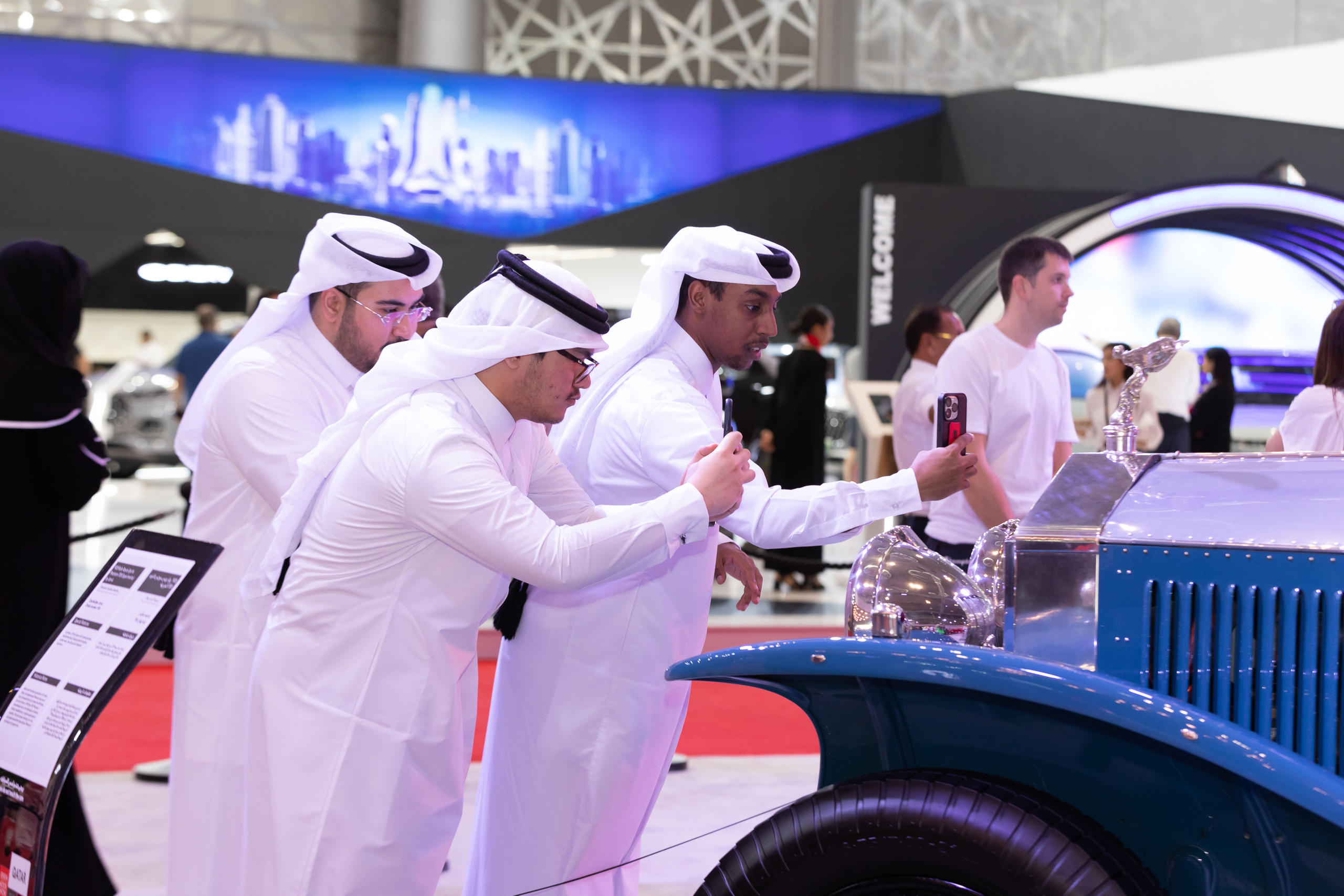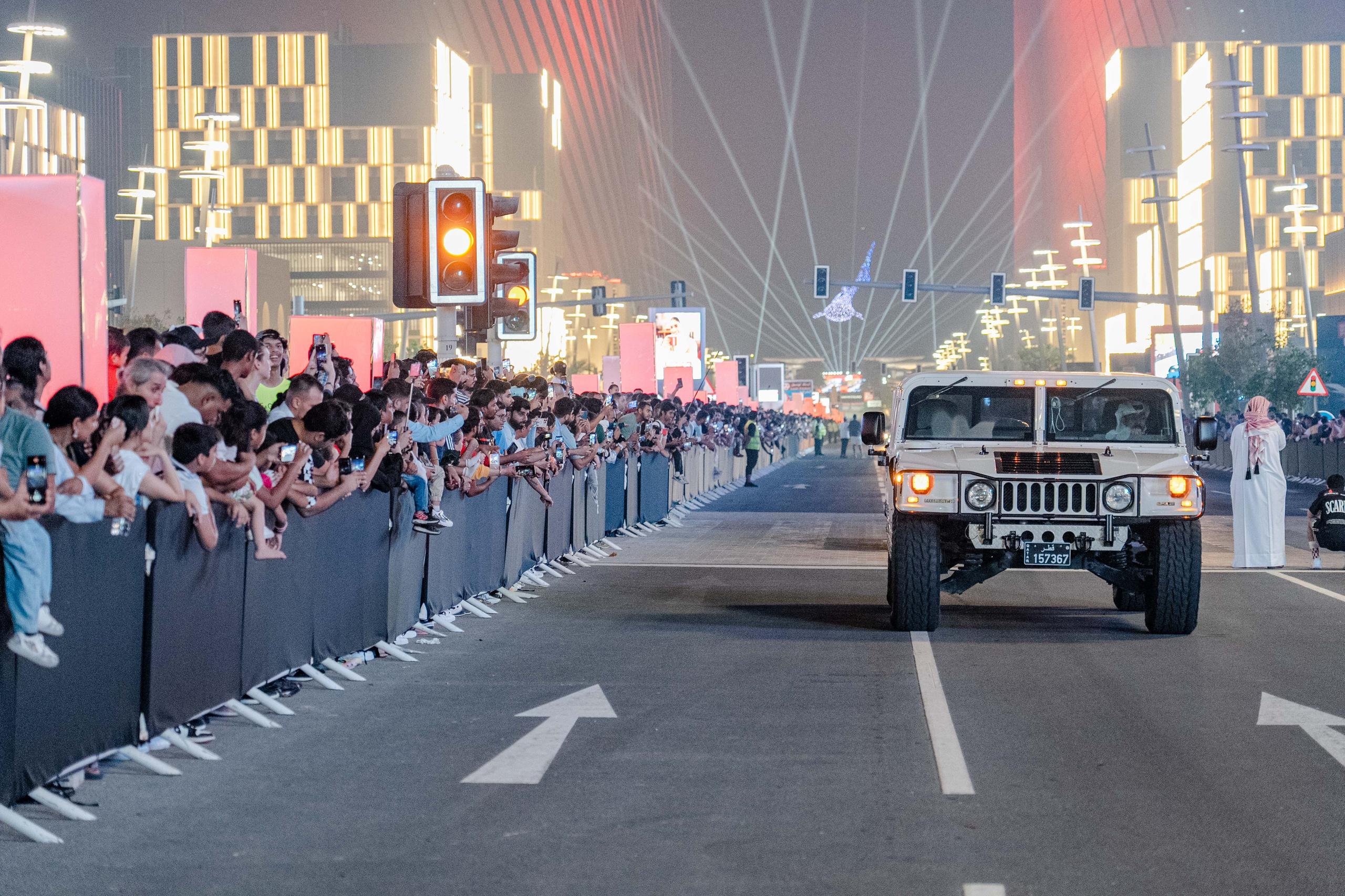
The end of the Geneva Motor Show may be near, warns auto expert

After three cancellations and a guest appearance in Qatar, the Geneva International Motor Show is back this year. But it hasn’t generated a huge amount of interest. Auto expert Stefan Bratzel talks to SWI swissinfo.ch about the event’s difficult revival and the winds of change blowing through the car industry.
In 1947 the Geneva “Salon d’Auto” was the first international car show to be held after the Second World War. This year it is attempting a comeback in the Swiss city after a pause caused by the Covid-19 pandemic.
Between 2020 and 2023 the Geneva International Motor Show, or GIMS, was not organised in Switzerland. But in 2023 it took place in Qatar in October instead of March, around the time of the Qatar Formula One Grand Prix. Around 180,000 people attended the car show in the Gulf state; this year 200,000 visitors are expected in Geneva between February 27 and March 3.

These are pretty modest figures when you look back at the 120-year history of the motor show. In 2005 almost 750,000 car fans flocked to Geneva. Even in 2019, when motor shows felt slightly old fashioned and a number of car makers were conspicuous by their absence, over 600,000 visitors passed through the doors of the Palexpo exhibition and convention centre.
This year all the big car manufacturers have decided not to attend. What does this mean for the future of the Geneva International Motor Show? Where is the crisis-hit industry heading? Stefan Bratzel, the founder and head of the Center of Automotive Management (CAM) in Bergisch Gladbach, Germany, and one of the leading auto experts in Europe, talks to SWI swissinfo.ch about the winds of change blowing through the industry.
SWI swissinfo.ch: Some people were already announcing the death of motor shows a few years ago. Then came the pandemic. Yet many shows are now starting up again. Do they really have a future, or is this just a last gasp of a format that has had its day?
Stefan Bratzel: I think there are only a few major motor shows that are still relevant. Shanghai and Beijing are relevant. The International Motor Show Germany (IAA), which takes place every other year, is one I would include here as well. Then it gets difficult, because the motor show format doesn’t really suit the times we are in.
Manufacturers now seek other channels to advertise their new vehicles. They are approaching the public, rather than the public approaching them, with pop-up stores in cities or using social media. The motor show world has been transformed, too. Electronic motor shows are playing a role because the automobile has become a digital product.
SWI: The motor show in Geneva was once a mecca for the industry. Now just about every major car maker is staying away, the big German names included. How should we interpret this shift?
S.B.: The costs are high, and the benefits no longer match. The automakers are looking carefully where they spend their money. I always liked going to Geneva because the motor show was very compact. The thinning of the ranks of exhibitors this year probably means the end. It might still turn out differently, but I can’t see it.

SWI: Last year the Geneva motor show went to Qatar and, financed by the oil-rich emirate, put on a spectacular event just before the Grand Prix. This year it’s back in Geneva, styled on an industry conference that is looking to the future. Does it have a coherent plan?
S.B.: I can’t see any strategy to it. Last year’s event in Qatar was the kind of thing you can do with enough money from the Gulf states. Linking a motor show to a conference may be a worthwhile idea, but I don’t know if it is practical and, especially, if enough visitors will want to attend. The appeal of the “event” experience is important these days, and that mostly happens outdoors. Yet at this time of the year the weather is not great. The Munich IAA, with exhibitions downtown, was a step in the right direction in that sense.
SWI: Geneva in its glory days was a sort of neutral ground where the automakers from the neighbouring countries and from Japan and the US could meet. Has the fact that Switzerland has no car brands of its own finally caught up with it?
S.B.: That’s an advantage the Germans have. When the car industry association can persuade their members of the value of a motor show, that means a great deal. Germany is also the largest car market in Europe.
Switzerland had an interesting function, at a time when motor shows were important. But those days are gone, and I don’t see them coming back.
SWI: Let’s say the Geneva show turns out to be a damp squib as people have been forecasting. How realistic is it to think that GIMS as an event brand might be sold off to Qatar?
S.B.: I don’t know what the financial implications would be. If interest in Geneva stays low, I could imagine a sale – the only question is: is there a buyer?

SWI: Marketing in the auto industry has changed. Exhibition halls don’t offer attractive images for TikTok or Instagram. Is the internet the mortal enemy of motor shows?
S.B.: The issue of digitalisation is playing a major role in this transformation, and in the way the manufacturers go to meet the buyers, with pictures and interactive elements. It all revolves around the basic question: how has the automobile changed? What’s the shape of things to come?
Years ago, the motor car was associated with status and style. That is changing in a very dynamic way. Marketing needs to keep up. For some customers, it comes down to basic mobility. Then there is the upper segment – sponsoring golf, tennis tournaments and regattas to enhance the brand’s profile. At the big motor shows many brands just became invisible, and some of those have been seeking out their own platforms for quite a while now.
SWI: But in China the traditional motor show still seems to have a future, doesn’t it?
S.B.: There are different stages of development depending on the country. In China we are talking about many people getting their first wheels. Digitalisation is already far advanced. But the motor shows in Shanghai and Beijing are something that will be there for a few years to come.
In Europe everything is likely to focus on one leading motor show: the IAA. Paris no longer counts. The other motor shows no longer count internationally. They are just regional shows.
SWI: The upheavals in the auto industry following digitalisation and the shift towards electric vehicles are also shaking up existing hierarchies. Are we seeing a new emerging order in the car industry, where China sets the pace?
S.B.: Absolutely. When I give lectures, I always try to talk about the new universe that is emerging and the new players that are at the forefront of electric and digital changes. Tesla has established itself. In China it’s BYD and MG that will certainly survive. The big data players have a part in this too – Nvidia, Alphabet and Tencent. Sony, Honda and Huawei are also getting involved. Long-established suppliers like Bosch have to adopt a new profile.

SWI: At the Geneva motor show there are two major Chinese manufacturers, BYD and MG Motor. Some people say they are making use of the vacuum here in Geneva to enter the market in Switzerland.
S.B.: That may be true. Both brands are performing strongly around the world, and no doubt they also want to grow in the European market. That won’t happen from one day to the next – they will have to rack up some experience. But just like Hyundai 20 years ago, they have a good chance to win relevant market share in Europe with their own added value.
Edited by Samuel Jaberg/adapted from German by Terence MacNamee/sb

In compliance with the JTI standards
More: SWI swissinfo.ch certified by the Journalism Trust Initiative





























You can find an overview of ongoing debates with our journalists here . Please join us!
If you want to start a conversation about a topic raised in this article or want to report factual errors, email us at english@swissinfo.ch.